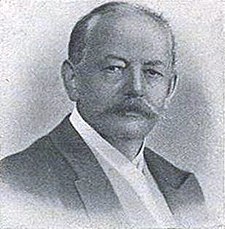Adolf Engler
| Adolf Engler | |
|---|---|
 Adolf Heinrich Gustav Engler | |
| Narození | 25. března 1844 Zaháň |
| Úmrtí | 10. října 1930 (ve věku 86 let) Berlín |
| Místo pohřbení | Botanická zahrada Berlín |
| Bydliště | Německo |
| Alma mater | Maria-Magdalenen-Gymnasium (do 1863) Mnichovská univerzita Vratislavská univerzita |
| Povolání | botanik, vysokoškolský učitel, sběratel rostlin, taxonom a kurátor sbírky |
| Zaměstnavatelé | Kielská univerzita (1878–1884) Vratislavská univerzita (1884–1889) Botanická zahrada Berlín (1889–1921) Humboldtova univerzita Technická univerzita Mnichov |
| Ocenění | Zlatá medaile Linného společnosti (1913) |
| Funkce | profesor |
| Některá data mohou pocházet z datové položky. | |
Adolf Heinrich Gustav Engler (25. března 1844, Żagań, Prusko – 10. října 1930, Berlín, Německo) byl německý botanik. Přispěl k výzkumu systematizace rostlin a založil botanickou zahradu v Berlíně.
Odkazy
Reference
V tomto článku byl použit překlad textu z článku Adolf Engler na slovenské Wikipedii.
- ↑ BRUMMITT, Richard Kenneth; POWELL, C. E. Authors of Plant Names. Kew: Royal Botanical Gardens, 1992. Dostupné online. ISBN 1-84246-085-4. (anglicky) Mezinárodní rejstřík jmen rostlin je zapracován do seznamu botaniků a mykologů dle zkratek.
Literatura
- Botanisches Museum Berlin: Adolf Engler - Die Welt in einem Garten. Prestel, München 2000. ISBN 3-7913-2315-6
- Frans A. Stafleu, Richard S. Cowan: Taxonomic literature. 2. ed., Band 1, A-G. Utrecht 1976. ISBN 9031302252
Externí odkazy
 Obrázky, zvuky či videa k tématu Adolf Engler na Wikimedia Commons
Obrázky, zvuky či videa k tématu Adolf Engler na Wikimedia Commons
Média použitá na této stránce
Adolf Engler, German botanist, printed photograph, 1914. Engler was born in 1844, which means that this text was printed in 1914. NYPL does not mention which publication this scan was made from. Text on original scan reads:
- Adolf Engler, one of the most important botanists of our time, can look back on a life of seventy years today. Born on March 25, 1844 in Sagan, he studied in Breslau from 1863-66, was a teacher there until 1871, became a curator of the botanical institutes in Munich and habilitated in 1872 as a private lecturer. Here he worked on a number of families for the "Flora brasiliensis", also provided other systematic work, notably on the Araceae among others, and studied the plant formations and their conditions of existence in the Alps. In 1878 extraordinary professor of botany and director of the botanical garden in Kiel, he went in 1884 in the same capacity as a successor of Göppert to Wroclaw, where he founded a botanical institute, and in 1889 to Berlin. In Kiel he wrote his main work: "Attempt at a developmental history of the plant world, in particular the floral regions of the Tertiary period" (2 volumes, Leipzig 1879-82). In 1902 he undertook a research trip through a part of East Africa.
